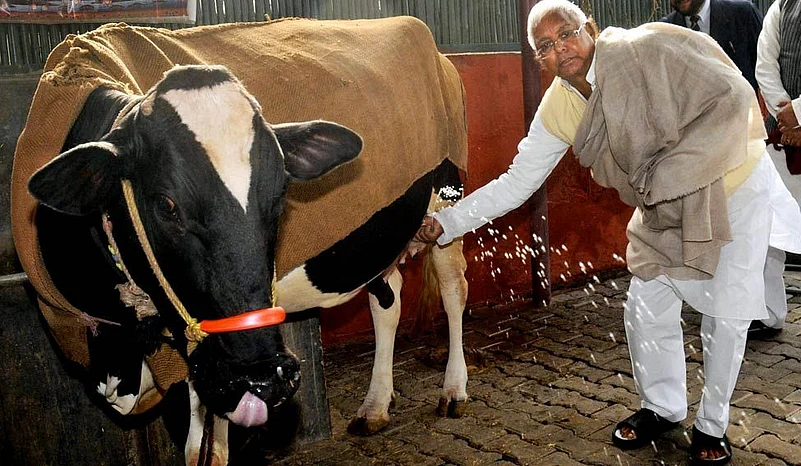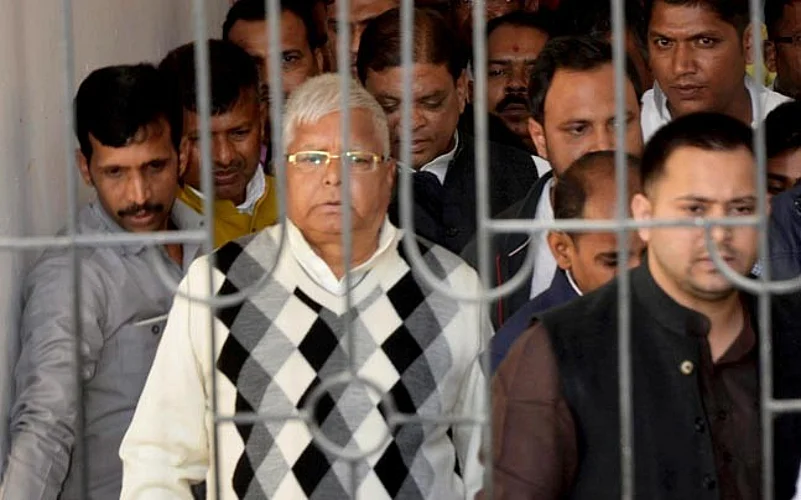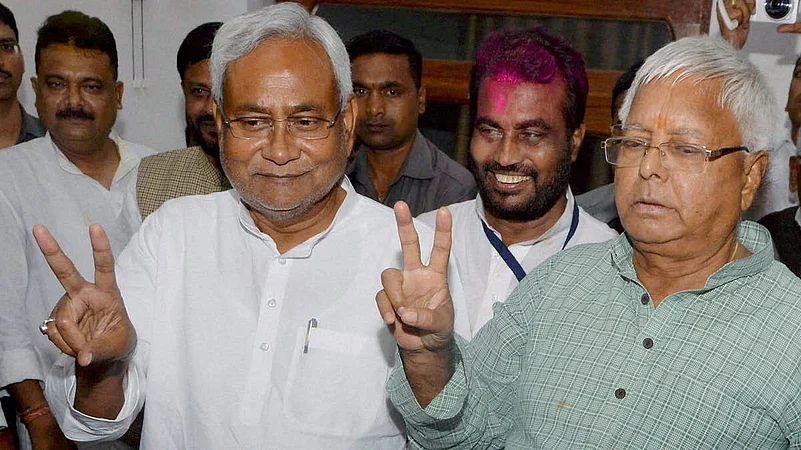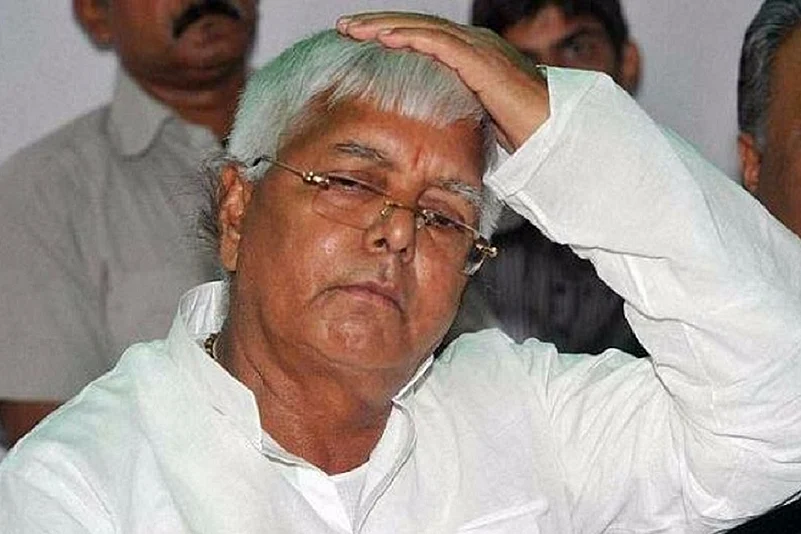“It’s true that I haven’t provided you swarg (heaven), but who can deny this reality that I haven’t given swar (voice) to you and your aspirations,” Rashtriya Janata Dal(RJD)supremo Lalu Yadav had once thundered in a public meeting. And the ‘crime’ for which Lalu was punished in fodder scam on December 22 was nothing but giving ‘voice’ to millions of downtrodden of Bihar.
And hold on, please! It doesn’t mean that Lalu is genuinely honest. My simple query is whether Jagannath Mishra is an honest politician who has been acquitted in the same case? A related question is equally important that all politicians preach on political transparency, but how many of them actually follow it? And if transparency is clearly a nonentity in public life, how come a political leader from Bahujan or Dalit background is punished and at the same time a leader from powerful forward caste is acquitted for a similar charge!
Advertisement
In reality, the notorious fodder scam was very much in existence long before Lalu Yadav came to power. After taking charge on March 10, 1990, in a routine administrative overhauling, Lalu Yadav also transferred the official, who was later known as the kingpin this scam. Former chief minister Jagannath Mishra wrote a letter to Lalu Yadav requesting to stay the transfer of that official. Lalu heeded Mishra’s request and stayed the transfer. This resulted in a big scam later on. In 1996, Lalu ordered an inquiry into this fraud. But feudal elements and people belonging to so-called upper caste mentality, who were eagerly waiting for an opportune time to dislodge Lalu for various reasons, grabbed this opportunity with both hands.
Advertisement

Just wait and recount the developments. Lalu Yadav took charge as the Chief Minister of Bihar on March 10, 1990. In his first address on Akashwani (AIR) as chief minister, he enlisted providing education and employment to all as his first priority. Stopping migration from the state was his second important priority. And he pronounced curbing corruption and resuming developmental activities as his third priority. If you surf next day’s (March 11, 1990) newspapers from Patna, you will find as if Lalu was an incarnation with divine powers, not a leader taking oath as the new chief minister of Bihar. But a few months later, on August 7, 1990, Prime Minister V P Singh announced his government’s decision to implement the recommendations of Mandal Commission and Lalu Yadav hailed that decision. The reason was simple. Implementation of Mandal Commission report was one of the main features of his party’s (Janata Dal) manifesto for elections.
Prime Minister V P Singh once again repeated this resolve of implementation of Mandal Commission from the ramparts of Red Fort on August 15 same year. This was followed by a widespread agitation against this decision across the country. At a public function in Patna, a strong protest was staged against chief minister Lalu Yadav by Mandal – baiters. In open retaliation, “All opposition against reservation will be bulldozed off,” thundered Lalu. This was his first aggressive stance as the chief minister, which surprised his supporters and detractors alike. In next two-three days, during an anti-reservation agitation in Patna, Shailendra Sharma, a student of B. N. College, died in the police firing. All of a sudden, a malicious campaign was started by the newspapers and other communication mediums against Lalu which depicted him as a villain. All this happened when Lalu’s tenure as chief minister was just four months 27 days old. After this, for upper caste dominated bureaucracy, media, academics and feudal elements, he was a monstrous personality which had to be eliminated at any cost.
Advertisement
Indeed, all this while, on the other hand, Lalu was tightening his grip over power structure through his political and administrative acumen. In order to neutralize Mandal – effect, veteran BJP leader Lal Krishna Advani embarked on a nationwide Rath Yatra. On the counter attack, addressing a mammoth all-party rally at Gandhi Maidan in Patna as Bihar chief minister, Lalu appealed Advani to terminate his Rath Yatra and issued a stern warning – “… No matter my government remains or goes, I will not allow spreading communal hatred in my state. Any mischievous attempt will be dealt with iron hand…Life of a common man is equally important as the Prime Minister of this country…” And Advani was finally arrested at Samastipur.
Advertisement

The way Lalu handled law and order situation in the state in the post Advani’s arrest scenario, he emerged as a strict and skilful administrator. If you scan the old files of the bookings of Gandhi Maidan at Collector’s office in Patna or mainstream newspapers of 1990 – 96, you would find various small castes’ rallies taking place at Gandhi Maidan with Lalu Yadav as the chief guest. In those rallies, leaders of small castes were seen narrating their aspirations before chief minister Lalu Yadav, who, in turn, assured them proper redressal of their grievances.
During his first tenure as the chief minister, in every public meeting, Lalu used to speak against corruption saying, “I will drink Gai ka Shonit (cow blood), if I accept bribes.” His anti – corruption rhetoric was being received in the same vein by the masses. But, on the contrary, media was busy in publicizing Lalu’s ‘statement’ – Bhura bal saaf karo (eliminate Bhumihars, Rajputs, Brahmins and Lalas). However, on many occasions, Lalu denied issuing such statement. But the downtrodden of Bihar perceived this ‘statement’ in a different manner. They saw Lalu as the only leader who had potential to befittingly counter the dominance of upper castes and feudal elements. That’s how, despite stiff resistance from powerful communities, Lalu’s influence was growing in Bihar as well as in national politics.
Advertisement
But at times, in the wake of rising popularity, one tends to make mistakes unknowingly though. The stupendous victories of Lalu’s party in Lok Sabha elections in 1991 and 1996 and assembly elections in 1995 pushed many of his well-wishers away from him. During that period, both of his infamous bother in-laws, with the consent of Lalu’s wife and then chief minister Rabri Devi, dwelt upon uncontrolled clout in the power circles. Upper caste dominated media termed those parallel power centers as ‘Jungle Raj’.

Even though Lalu himself started behaving as a dictator or king, the way he challenged the dominance of upper caste bureaucracy, academics and media was really exemplary in Indian democratic history. Lalu’s another fault was his failure in creating an alternative structure or mechanism which could end the dominance of upper castes and feudal elements forever. He even failed in ensuring the hegemony of downtrodden in the existing system of power. The only field where he, as the head of the government, could exercise some control was bureaucracy.
Advertisement
He had support of bureaucrats belonging to Dalit, backward and minority communities. It is pertinent to note here that though politics of Mandal was increasingly dwelling its clouts in Indian political arena, but very few candidates from Dalit and backward communities could enter into the bureaucracy by the virtue of reservation provided by the Mandal Commission at that time. With the tacit support of these Dalit – backward caste bureaucrats some youth from backward communities could become contractors, but majority of them were from Yadav caste. Reason behind this was quite obvious. Candidates from Dalit and other backward castes hardly had requisite resources for this business. Later on, citing the examples of these Yadav contractors, Lalu’s opponent lamented him for benefitting his own caste men only.
Advertisement
The process of “evolving as a bigger king than Hathuwa Maharaj” was very scary. Many of his supporters openly resorted to dreadful activities and encouraged lumpenism. Meanwhile, fodder scam came to fore and Lalu ordered inquiry into it. Upper caste bureaucrats, academics and media took it as a golden opportunity to discredit Lalu and his regime. They portrayed this fraud as a biggest scam of the world. To malign Lalu, they used all those things against him which he had carefully cultivated to bolster his politics and image. For example, his detractors, drawing analogy from the word ‘Gwala’, connected fodder with cows. The person, who once swore by cow-blood if caught in corruption, was branded as a thief of fodder meant for cows.
Advertisement

The big blow came from the CBI, which assigned the investigation of this scam to U N Biswas. Biswas’s Dalit background was cleverly used as a rhetoric that a Dalit is fighting against the mess created by the “Messiah of backwards”. Though Lalu himself had announced that he would surrender in 24 hours, U N Biswas consulted the concerned judge hearing fodder scam cases for his arrest. This step of Biswas was totally illegal, unconstitutional and against the prescribed protocol. Logically Biswas was liable for a stern action for this step, but upper caste people sitting at the helms didn’t bother about this for they were desperate to get rid of Lalu at any cost. Former Prime Minister Chandrashekhar had severely criticized Biswas’s step in the parliament. He said, “When Lalu Prasad has himself announced to surrender in next 24 hours, what was the urgency to call Army for his arrest? An atmosphere was created as if the entire nation is standstill because of this very issue only. Lalu was not fleeing away…. Character assassination is quite easy; it is easy to malign someone’s personality. But neither you nor we have that much capability to create another Lalu Prasad. …Yes, corruption should be abolished. But money exchanging hands is not the only way of corruption. There is a word Hindi called Satyanishtha. If there is no Satyanishtha (Integrity), it is difficult to run the government…. The CBI has crossed its limits; it’s also true that Army personnel, officers, declined to pay heed to the request… It is quite evident that one person from the CBI had gone beyond his limits…The whole structure of the country would be collapsed, if police personnel start calling Army at their will.”
Advertisement
In order to weaken Lalu, then Prime Minister Deve Gowda and his successor I K Gujaral gave the CBI all freedom to go to any extent in Lalu’s case. Under the leadership of Karnataka cadre IPS officer Joginder Singh, U N Biswas was doing all those things which could jeopardise Lalu’s politics. In the name of fodder scam, his glamour started fading. Media, across the nation, came out with spicy stories on fodder scam and narrated how bulls had been transported on scooters in Bihar! It also explained how a shepherd ate cows’ fodder. It is pertinent to note here that Lalu repeatedly, in his speeches, used to call himself a shepherd.
Advertisement
Now, Lalu is a convict and can’t contest an election. Those, who are involved in organised plunder in connivance with big corporates, are now criticizing Lalu’s corruption and giving sermons on political transparency. Indeed, as of now, there is no proof against them and there is hardly any intention to start a thorough and impartial inquiry against them. There is a perception that proofs have been cultivated against Lalu as it was a political necessity for those who are now sitting at helms, both at the Centre as well as in Bihar.
One of the interesting explanations of the political transparency is that the same Deve Gowda, who outsourced the task of Lalu’s political elimination to Joginder Singh, came to New Delhi for the first time after being elected as the new prime minister of the country in Vijay Mallaya’s charted plane itself. There is a perception that attempts have been started to declare public sector banks as bankrupt to benefit corporate sector of this country. Lalu has been put behind the bars for a fraud of Rs 89 lacks while Jagnnath Mishra has been acquitted in the same case. A section of people feel tha the caste configuration of Indian judiciary has multiplied Lalu’s worries in a big way.
Advertisement
Now Lalu is not merely a politician, but he has emerged as a phenomenon. The way he has altered the social character of north Indian politics is quite extra ordinary. On this count, only Mayawati can come closer to him. This is the reason why Brahamanical forces are scared of these two powerful leaders. Perhaps keeping this factor in mind, V. P. Singh had once said, “ Don’t go by the name plates on the doors, the real change is that when the lives of downtrodden undergo significant and positive changes.” Lalu has catalyzed that phenomenon in true sense. It’s true that Lalu’s popularity has declined a bit and he is currently behind the bars, but because of his contributions, the Brahmanical party like BJP is compelled to enter into an alliance with Dalit and backward castes leaders like Nitish Kumar, Upendra Kushwaha, Jitanram Manjhi, and Ram Vilas Paswan etc. Academicians and experts are so morally dishonest and unfaithful towards Lalu’s contributions that they remember all minute details of remarkable decisions taken by Lenin or Bismarck or Nelson Mandela, but the revolutionary steps undertaken by Lalu regime reminded them of ‘Jungle Raj’!
Advertisement
The recent verdict against Lalu Yadav has shaken faith in Indian democratic system. Had he not been vocal enough against the present NDA government at the Centre, he too might have enjoyed his freedom today. Whenever he was in power, he ably controlled communal, fanatic and castist elements with an iron hand. This is the reason why he has been pronounced guilty in the fodder scam and thereby sent to the jail in Ranchi. There had been some judgments in the past too which were quite surprising. Such judgments shake the confidence of those sections whose predicaments are regularly raised by Lalu. We must not forget that had Lalu not been trapped in fodder scam, his image could have been larger than life. In his second tenure as the chief minister of Bihar, he was caught in the web of fodder scam and his whole focus was on getting rid of this problem. In a way, he had hardly any opportunity to undertake welfare schemes for the masses.
Advertisement
Leaders like Lalu Yadav face a unique problem. They have sizeable mass support but hardly have adequate resources to carry forward their politics. Corporate houses don’t give them money as a part of a ‘deal’ when these leaders don’t agree with their ‘terms & conditions’. But once tasted power, these leaders want to grab it at any cost like others. So, they come out with some “agreeable offers”. At times, they succeed in clinching the pact with corporate houses. But most of the times, they fail in their endeavour. This is the reason why, in their second term, they ruthlessly close all those welfare schemes which are initiated during their term.
Advertisement
(Writer is Delhi based journalist. Views are personal)




















